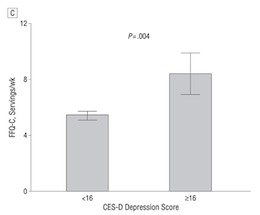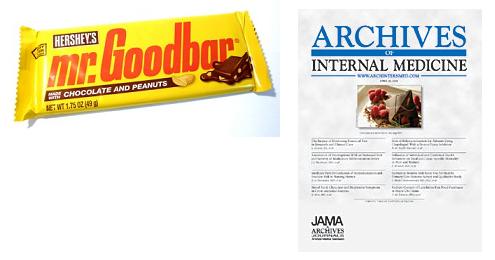April 30, 2010
Study Finds Chocolate Causes Depression. In Other News, These Kinds Of Studies Cause Insanity

all three of us are crying inside
From the Abstract:
Results Those screening positive for possible depression (CES-D score >16) had higher chocolate consumption (8.4 servings per month) than those not screening positive (5.4 servings per month) (P = .004)

Oh god, please, I need a drink.
The authors are very careful to assure everyone that they don't mean to imply that chocolate causes depression, this is just an association. Let's not jump to conclusions.
II.
Chocolate lovers 'are more depressive,' say experts- BBC
The More Chocolate You Eat, the Higher Your Risk of Depression, Study Hints-- ABC News
Chocolate And Depression Go Hand In Hand- CNN. First sentence:
When Dina Khiry is feeling a bit down, she reaches for chocolate. "I like Reese's peanut butter cups, Hershey's bars, and chocolate cake batter," says the 24-year-old public relations associate. "I feel better in the moment -- and then worse later on, when I realize that I just consumed thousands of calories."Does anyone understand that there is barely any chocolate in any of those chocolates? Even the Hershey's Bar, which has the highest of all of them, has 10% chocolate liquor (smashed cacao beans.) And if the box doesn't say "milk chocolate," then all bets are off. White chocolate has plenty of cocoa butter, but no chocolate solids. And no caffeine, theobromine, or flavinoids. Still counts, though, right?
And see the phrase "cocoa processed with alkali" in the ingredients of "chocolate cake batter"? Alkalinization (makes it easier to mix) drains the cocoa of the flavinoids. Is it going to "work" the same? That's like saying "rum processed with fire" will have the same mood stabilizing effects. IT DOESN'T. I'VE TRIED IT.
 simulacra
simulacraThe study, as best as I can tell, did not ask them what kind of chocolate they were eating, it only measured "ounces of chocolate candy." Is an ounce of chocolate covered cocoa beans the same as an ounce of Hershey's Krackel, which has no cocoa butter (all vegetable oil)? (1) The only thing they have in common is a disdain for fair trade.
Can you imagine if someone did a study about mood and alcohol consumption, and measured it as "ounces of an alcoholic beverage" but didn't specify beer, wine, spirits, or rubbing?
III.
On the one hand we have no idea how much chocolate was in a serving, if there was any at all.
On the other hand we have "depression." What's a CES-D?
It's a 20 question 0-3 survey that people answer about their mood over the past week. Think about this.
The scale doesn't diagnose depression at all; you could have had 30 suicide attempts in the past year and happen to have had some sex this week and come out fine on the inventory; or, you could have been the merriest gal in the whole wide world until your stupid boyfriend dragged you to see Avatar and now you're calling a hotline. So?
Can you really link a chronic behavior (e.g. eating chocolate) with a static observation of mood over one single week? I mean, I know you can, but shouldn't there be some kind of law?
IIb.
Each of the 20 questions are scored:
- 0 points Rarely or none of the time (< 1 day)
- 1 point Some or a little of the time (1-2 days)
- 2 points Occasionally or a moderate amount of the time (3-4 days)
- 3 points Most or all of the time (5-7 days)
Then why, in order to show increased chocolate is associated with increased depression, do they use the binary standard of >16 and <16?
Worse:
The mean CES-D score was 7.7, with a median of 6.0. The CES-D scores ranged from 0 to 45 (maximum possible score, 60).
So let me rewrite the abstract: "in a study of people who were not depressed, people who were more not depressed last Thursday than others have been eating a little bit less of something they thought may have smelled like chocolate."
III.
You're probably asking why I would bother to pick apart a relatively unimportant study. That's the reason. Why is it in one of the most important medical journals? Does it answer any questions? No. Does it direct future experiments? No. Does it completely confuse an already confused public, who only yesterday were told that just the right amount of mercury in your diet is awesome, only to have scienticians later correct that to silver?
Let's review:
uncontrolled use of the word "chocolate" +
unclear metric for assessing consumption of what little chocolate is in the Peanut Butter Cup+
vague definition of depression offered to a public that already thinks "depression" means something else+
illogical link between chronic behavior and time x +
three reviewers +
one editor +
=
article in Archives of Internal Medicine, and all the free press you could ever want.
But wasn't there anything encouraging about this study?
Of course there was! Thank GOD, thanks be to GOD-- this study was free of the corrupting poison of Big Pharma. In your face, Pfizer! Science can dress up in its sexiest minidress and strut confidently down the dark alley of ignorance and prejudice, unafraid and unmolested because it is protected by the enveloping goodness of the NIH. You go, girl!
 this is going to turn out great
this is going to turn out great-----
(1) Hershey's, et al, petitioned the FDA and EU to allow them to change the definition of "milk chocolate" to allow for the substitution of vegetable oil for cocoa butter. The FDA said no, but the EU thought it would be awesome idea.
To emphasize: not simply change the ingredients, but to change the definition of the word.
46 Comments